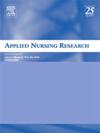Psychometric testing of the caring for the caregiver survey for healthcare providers
IF 2.2
4区 医学
Q1 NURSING
引用次数: 0
Abstract
Aim
The purpose of this study was to assess the factorial structure and model fit of the Caring for the Caregiver Scale.
Background
Caregiving is an all-encompassing role that results in negative health consequences. Healthcare providers require specific knowledge and clinical skills to support caregivers with health promotion. There is no instrument to measure healthcare providers' knowledge, attitudes, and practices on assessing and supporting caregivers. The Healthcare Provider Caring for the Caregiver Scale was developed to identify gaps in healthcare providers' knowledge and clinical practices and help pinpoint areas where interventions may be necessary.
Methods
Exploratory factor analysis and absolute fit measures were used to evaluate the factorial structure and model fit of the instrument. A multidimensional ordinal Rasch and differential item functioning test was used to fit a three-dimensional partial credit model and ensure the validity of the use of the instrument across subgroups.
Results
A three-factor model was confirmed based on fit statistics and the clustering of the inter-item correlations. The composite measure across 30 items demonstrated strong internal consistency and excellent reliability. Item fit indices estimated from the Rasch model indicated an overall good fit except for two items showing a misfit.
Conclusions
The Caring for the Caregiver Scale demonstrates sufficient factorial structure and model fit making it valuable in evaluating healthcare providers' knowledge, attitudes, and practices with assessing and supporting caregivers. Data collected from this instrument may identify gaps in knowledge and clinical skills and guide intervention development that enhances healthcare providers' ability to deliver quality care to caregivers.
医疗服务提供者照顾照护者调查的心理测试。
目的:本研究的目的是评估照顾者照顾量表的因子结构和模型拟合。背景:看护是一个包罗万象的角色,会对健康产生负面影响。医疗保健提供者需要特定的知识和临床技能来支持护理人员促进健康。没有工具来衡量卫生保健提供者的知识,态度和实践评估和支持护理人员。制定《医疗保健提供者照顾护理者量表》是为了确定医疗保健提供者的知识和临床实践方面的差距,并帮助确定可能需要干预的领域。方法:采用探索性因子分析和绝对拟合方法对仪器的因子结构和模型拟合进行评价。采用多维有序的Rasch和微分项目功能测试来拟合三维部分信用模型,并确保工具使用的有效性。结果:通过拟合统计和项目间相关的聚类,确定了一个三因素模型。30个项目的综合测量显示出很强的内部一致性和良好的可靠性。从Rasch模型估计的项目拟合指数表明,除了两个项目显示不匹配外,整体拟合良好。结论:照顾照顾者量表具有充分的析因结构和模型拟合,使其在评估医疗保健提供者的知识、态度和实践中具有价值,可以评估和支持照顾者。从该工具收集的数据可以确定知识和临床技能方面的差距,并指导干预措施的发展,从而提高医疗保健提供者向护理人员提供高质量护理的能力。
本文章由计算机程序翻译,如有差异,请以英文原文为准。
求助全文
约1分钟内获得全文
求助全文
来源期刊

Applied Nursing Research
医学-护理
CiteScore
4.50
自引率
0.00%
发文量
65
审稿时长
70 days
期刊介绍:
Applied Nursing Research presents original, peer-reviewed research findings clearly and directly for clinical applications in all nursing specialties. Regular features include "Ask the Experts," research briefs, clinical methods, book reviews, news and announcements, and an editorial section. Applied Nursing Research covers such areas as pain management, patient education, discharge planning, nursing diagnosis, job stress in nursing, nursing influence on length of hospital stay, and nurse/physician collaboration.
 求助内容:
求助内容: 应助结果提醒方式:
应助结果提醒方式:


